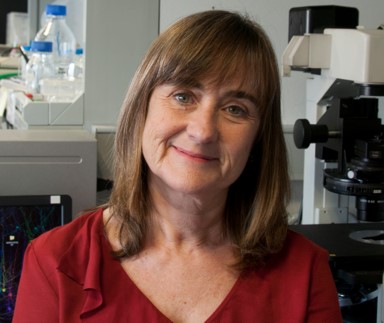INSTITUTE SEMINAR
PRKD1 and KIDINS220 role in brain function: From Common to Rare Neurological Disorders
Speaker
Teresa Iglesias
Date and time
February 23 2024 12.30
Place
Cajal Institute
Abstract
Excitotoxicity plays a pivotal role in various human neuropathologies, particularly in dementia-associated conditions such as chronic neurodegenerative diseases like Alzheimer´s disease, as well as those resulting from acute brain damage like ischemic stroke. During excitotoxicity, glutamate overload overstimulates postsynaptic ionotropic N-methyl-D-aspartate (NMDA) type of glutamate receptors (NMDARs), overexciting neurons. This process triggers oxidative stress damage and initiates pro-death cascades. Consequently, ionic homeostasis in neurons and astrocytes is disrupted, resulting in swelling, synaptic dysfunction, and neuroinflammation. Several years ago, we started investigating the impact of excitotoxicity on Kidins220 and Prkd1, identifying neuroprotective properties associated with these proteins. Using mice with conditional deletion of Prkd1 either in neurons or astrocytes, along with Kidins220 deficient mice, we have explored how the elimination of these molecules affects brain function. I will present our latest findings, which have redirected our research efforts towards studying rare neurological disorders linked to PRKD1 and KIDINS220.
Affiliation and short bio

Teresa Iglesias is a full Professor of the Spanish Research Council (CSIC) and Honorary Professor of the Biochemistry Department at the Medical School of Madrid Autonomous University (UAM). She is head of the group “Novel Targets in Neurodegeneration and Neuroprotection” at “Sols-Morreale” Biomedical Research Institute (IIBM; CSIC-UAM), and Principal Investigator of CIBERNED (Network Center for Biomedical Research in Neurodegenerative Diseases, ISCIII). She is also coordinator of CIBERNED training programme and member of several Advisory Panels and Scientific Committees. She obtained her PhD at the Complutense University Medical School, in Madrid, investigating the effects of stress in the central nervous system control of depression and hypertension. As postdoctoral fellow at the IIBM, she was involved in the identification of genes contributing to neurological deficiencies in hypothyroidism. Later she moved to the Imperial Cancer Research Fund in London (UK), where she started working on Protein Kinase D 1 (PRKD1). She is an expert in neurosignalling and has been studying PRKD1 neuronal functions for more than 20 years, having identified and cloned its first substrate, KIDINS220 (Kinase D interacting Substrate of 220 kDa). Her group has discovered the neuroprotective role of these two proteins and their dysfunction in neurological and neurodegenerative diseases.
Related publications with the topic
1.- Pose-Utrilla J*, García-Guerra L*, Del Puerto A, Martín A, Jurado-Arjona J, De León-Reyes NS, Gamir-Morralla A, Sebastián-Serrano A, García-Gallo M, Kremer L, Fielitz J, Ireson C, Pérez-Álvarez MJ, Ferrer I., Hernández F, Ávila J, Lasa M, Campanero MR & Iglesias T (2017). Excitotoxic inactivation of constitutive oxidative stress detoxification pathway in neurons can be rescued by PKD1. Nat. Comm. 2017 Dec 22;8(1):2275. DOI: 10.1038/s41467-017-02322-5.
2.- Sebastián-Serrano Á, Simón-García A, Belmonte-Alfaro A, Pose-Utrilla J, Santos-Galindo M, del Puerto A, García-Guerra L, Hernández IH, Schiavo G, Campanero MR, Lucas JJ & Iglesias T (2020). Differential regulation of Kidins220 isoforms in Huntington´s disease. Brain Pathol. 2020 Jan;30(1):120-136. DOI: 10.1111/bpa.12761.
3.- Del Puerto A, Pose-Utrilla J, Simón-García A, López-Menéndez C, Jiménez AJ, Porlan E, SM Pajuelo L, Cano-García G, Martí-Prado B, Sebastián-Serrano A, Sánchez-Carralero MP, Cesca F, Schiavo G, Ferrer I, Fariñas I, Campanero MR & Iglesias T (2021). Kidins220 deficiency causes ventriculomegaly via SNX27-retromer-dependent AQP4 degradation. Mol Psychiatry. 2021 Nov;26(11):6411-6426. DOI:10.1038/s41380-021-01127-9.
4.- Del Puerto A, Lopez-Fonseca C, Simón-García A, Martí-Prado B, Barrios-Muñoz AL, Pose-Utrilla J, López-Menéndez C, Alcover-Sanchez B, Cesca F, Schiavo G, Campanero MR, Fariñas I, Iglesias T* & Porlan E* (2023). Kidins220 sets the threshold for survival of neural stem cells and progenitors to sustain adult neurogenesis. Cell Death Dis. 2023 Aug 4;14(8):500. DOI: 10.1038/s41419-023-05995-7.
